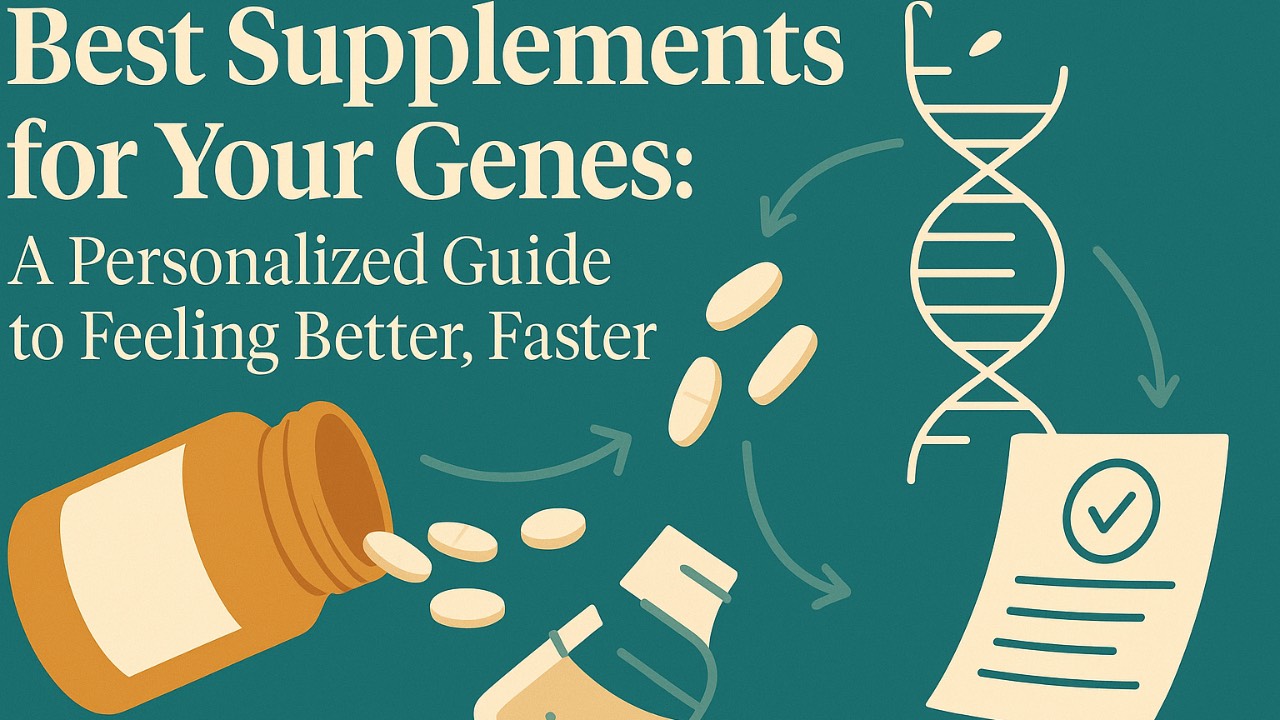Best Supplements for Your Genes: A Personalized Guide to Feeling Better, Faster
May 02, 2025
Why Supplements Don’t Work the Same for Everyone
You’ve probably tried supplements before.
Maybe a daily multivitamin. Maybe magnesium to help you sleep. Maybe methylated B12 after someone mentioned MTHFR on a podcast.
Some of them might’ve helped. Others? Not so much. Or maybe they made you feel worse… more anxious, wired, or just… off.
That’s when most people start asking: Is it me? Or are we all just guessing?
The truth is, most supplement advice is based on averages. But your body isn’t average, it’s uniquely wired. And your genes are the blueprint that you’re missing.
How Genetics Shape Your Supplement Needs
Your genetics influence how your body:
- Activates and uses nutrients like folate and B12
- Clears neurotransmitters like dopamine and serotonin
- Detoxifies chemicals, handles inflammation, and responds to stress
So when someone thrives on a supplement that makes you feel overstimulated or fatigued, it doesn’t mean there’s something wrong with you. It just means your system works differently.
Understanding your genes turns random guessing into real, tangible, strategy.
The 5 Core Systems Your Supplements Should Support
Most symptoms, like brain fog, fatigue, irritability, or anxious thoughts, often trace back to a few core systems that need better support.
Here’s a breakdown of how genetics impacts those systems and how to pick the right supplements based on how your body is built.
1. Methylation Pathway: Your Cellular Activation Circuit
Relevant Genes: MTHFR (C677T, A1298C), MTRR, MTHFD1
What Goes Wrong
If this system is sluggish, your body struggles to activate essential nutrients. This can make you feel mentally foggy, chronically tired, or sensitive to stress.
Common Clues
- Anxiety or panic from methylated B vitamins
- Low energy that doesn’t improve with supplements
- Emotional swings or trouble bouncing back from stress
Smart Supplement Strategy for Methylation
- Start with hydroxo B12 or folinic acid instead of jumping into methylated forms
- Add one product at a time and go slow—especially with anything labeled “methyl”
- Observe how you feel over 3–5 days, not just immediately
2. Neurotransmitter Clearance: The COMT / MAO-A / MAO-B Balance
Relevant Genes: COMT (V158M, H62H), MAO-A, MAO-B
What Goes Wrong
These genes control how quickly your brain clears stimulating neurotransmitters like dopamine and serotonin.
When clearance is slow, you can feel edgy or overstimulated.
When it’s fast, you may feel flat, foggy, or unmotivated.
Common Clues
- Wired-but-tired feeling
- Overreacting to stress, caffeine, or green tea
- Difficulty winding down after intense emotions
- Mood instability or emotional “numbness”
Smart Supplement Strategy for Neurotransmitter Balance
- If slow clearance: Magnesium glycinate, L-theanine, and phosphatidylserine can calm the system
- If fast clearance: Gentle support with tyrosine, SAMe, or rhodiola may help—but go low and slow
- Skip stimulating B vitamins in the evening if you have trouble sleeping
3. Histamine Intolerance: The Hidden Sensitivity
Relevant Genes: DAO, HNMT, FADS2
What Goes Wrong
Histamine intolerance occurs when your body can’t break down histamine effectively. It acts like a neurotransmitter and an immune signal—so when it accumulates, symptoms can mimic anxiety, digestive upset, or skin issues.
Common Clues
- Flushing, headaches, or anxiety after wine, leftovers, or fermented foods
- Mood shifts or irritability during allergy season
- Unpredictable bloating, skin flare-ups, or congestion
- Trouble falling asleep or staying asleep, commonly waking up at 2-4 am for no apparent reason.
Smart Supplement Strategy for Histamine Support
- Use vitamin C, quercetin, or DAO enzyme capsules before histamine-rich meals
- Avoid high-histamine foods (like aged cheese, sauerkraut, smoked meats) during flares
- Support methylation before aggressively pushing antihistamine supplements
4. Glutamate-GABA Balance: The GAD1 Equation
Relevant Gene: GAD1
What Goes Wrong
GAD1 converts excitatory glutamate into calming GABA. When this conversion is slow, your brain stays alert even when your body is tired.
Common Clues
- Difficulty falling asleep or waking up anxious
- Easily startled or hyper-aware of surroundings
- Anxiety that feels “in your body” more than in your mind
Smart Supplement Strategy for GAD1 Support
- Taurine, glycine, and magnesium threonate support GABA production
- Inositol may help reduce racing thoughts and mental loops
- Layer in calming rituals like slow breathing or quiet pacing alongside supplements
5. Mitochondria and Detox: Your Resilience Engine
Relevant Genes: NQO1, SOD2, PEMT, GSTM1
What Goes Wrong
These genes affect how efficiently your body produces energy and clears toxins. When underfunctioning, even wellness habits like detoxes or saunas can leave you feeling depleted.
Common Clues
- Fatigue after exercise, cleanses, or sauna sessions
- Brain fog in musty or moldy environments
- Reactions to skincare, household cleaners, or strong supplements
Smart Supplement Strategy for Mitochondria Support
- Try glutathione precursors like NAC or glycine instead of direct glutathione
- Use CoQ10 or PQQ to gently support cellular energy
- Always pair detox efforts with hydration and mineral support (like magnesium and trace minerals)
Final Thought: Personalization Is the Shortcut
The best supplements for your body aren’t the trendiest or most expensive, they’re the ones that match your biology.
Your genetics can’t tell you exactly what to take, but they can show you what to pay attention to, where your system needs more support, and where to tread lightly.
You don’t need a full cabinet of pills. You need a handful of the right ones, in the right form, at the right time.
When you stop guessing and start listening to what your body’s trying to tell you, you don’t just feel better. You feel more like yourself again.
Haven’t Completed a Genetic Test Yet?
If you’re reading this and thinking, “I haven’t done any of this yet, but I’m curious,” you are not behind.
If you’re looking for a genetic panel that covers all five systems above, methylation, histamine, detox, neurotransmitters, and hormone clearance — this is the panel I trust and use in practice.
It is called The Works Panel by MaxGen Labs and it’s the same test I’ve used with hundreds of patients over the years to guide real, personalized care.
You can start there. And come back here when you are ready to make sense of what you find.


